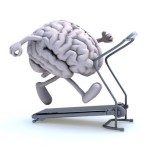 The role of folic acid and vitamin B12 in memory and cognition is pretty well established. Research appearing in the American Journal of Clinical Nutrition (2007; 86(5): 1384-1391) looked at 1,648 subjects over the age of 65 over a 10-year period. During the 10-year course of the study cognitive function and vitamin B12 levels were tested at least three times. High vitamin B12 levels were associated with slower rates of cognitive decline. An earlier study appearing in the American Journal of Clinical Nutrition (1996;63:306-14). That study also found that high levels of B6 were associated with better memory.
The role of folic acid and vitamin B12 in memory and cognition is pretty well established. Research appearing in the American Journal of Clinical Nutrition (2007; 86(5): 1384-1391) looked at 1,648 subjects over the age of 65 over a 10-year period. During the 10-year course of the study cognitive function and vitamin B12 levels were tested at least three times. High vitamin B12 levels were associated with slower rates of cognitive decline. An earlier study appearing in the American Journal of Clinical Nutrition (1996;63:306-14). That study also found that high levels of B6 were associated with better memory.
In research appearing in Clinical Biochemistry (2007; 40(9-10): 604-608) found a connection between low folic acid and vitamin B12 levels, and depression in 66 subjects over the age of 60. Also the depressed subjects tended to have higher homocysteine levels.
There is not a lot of research on the connection between niacin and memory. Although in the severe niacin deficiency disease, pellagra, there are mental symptoms. Symptoms in the central nervous system can include memory impairment, disorientation, confusion, and confabulation (excitement, depression, mania and delirium). Some patients may become paranoid.
One study, appearing in the Journal of Neuroscience (2008 November 5;28(45):11500-10) looked at the effect niacinamide (a form of niacin) had on memory in rats. The rats in the study were normal rats and rats specially bred to develop a disease similar to Alzheimer’s disease in humans. Over a period of four months rats were either given niacinamide in their water or a placebo. In the rats bred for the Alzheimer’s-like disease, there was an increase in proteins used to strengthen brain tissue and there was a decrease in material that could lead to plaquing. The specially bred rats who received the nicacinamide performed as well on memory tests as the normal mice, while the untreated rats demonstrated loss of memory.





